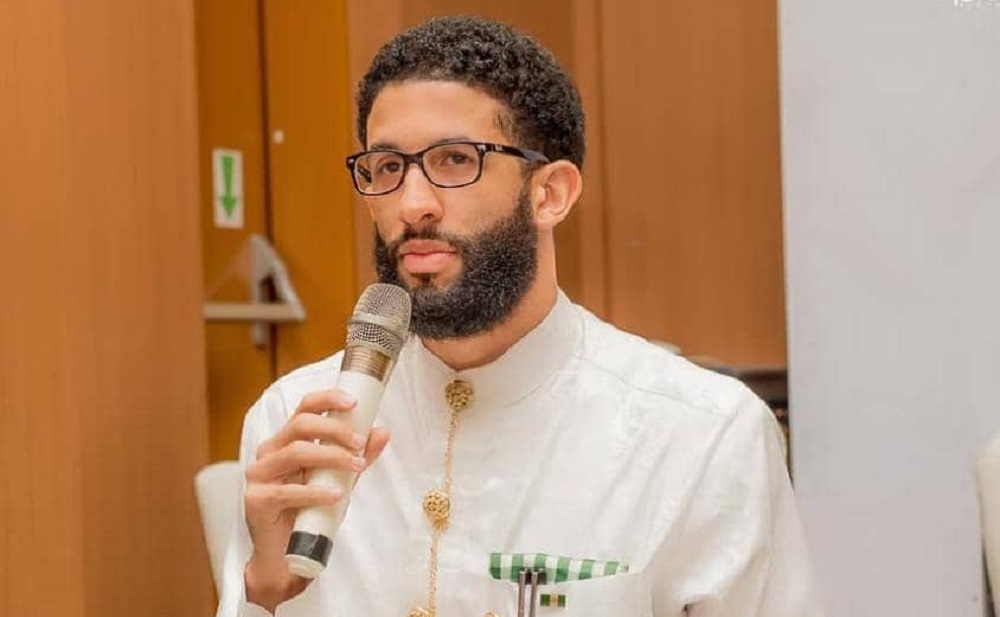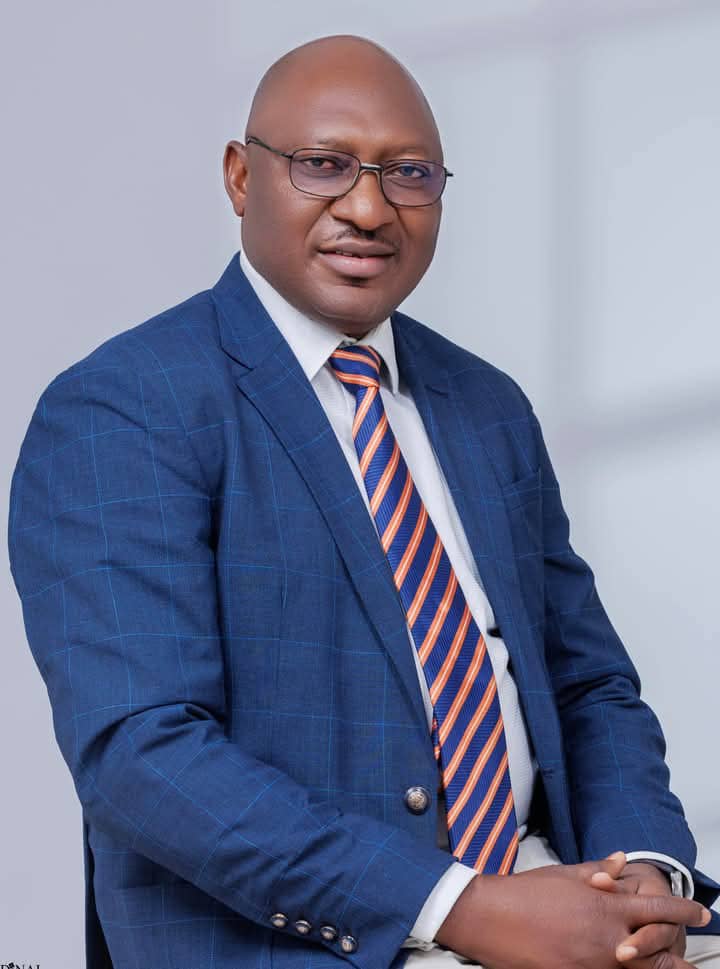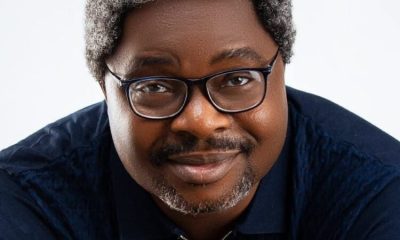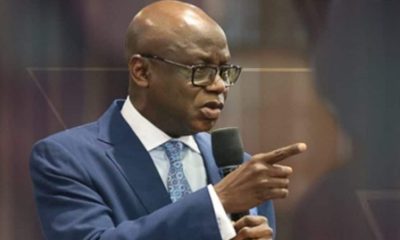Opinion
Can We Let Ajuri Ngelale Be?

By Yinka Adaranijo
Against the backdrop of their roles in the management of media and communications during the campaigns of President Olusegun Obasanjo, a few names were already engraved in the public consciousness who could possibly lead his communication team. Dele Alake, Bayo Onanuga and Tunde Rahman were at the very top of the list. Alake and Onanuga indeed had very long relationships with Tinubu beginning from their years as editors of major newspapers and magazines. They were potent operatives with Tinubu and concerned Nigerians opposed to the better forgotten fistic rule of General Sani Abacha. They were the arrowheads of the “underground press” which reported the despondency of the Nigerian sociopolitical situation to the international community under the famously repressive reign of Abacha.
Alake served as Tinubu’s topmost publicist in the latter’s years as governor of Lagos State. Alake it was who affixed the schedule “strategy” to the primordial brief of information commissioner. This has since been widely adopted by many who barely understand the origins of the initiative. Onanuga was director-general of the News Agency of Nigeria, (NAN), under Buhari, courtesy of Tinubu. Rahman succeeded Sunday Dare who would later serve as sports minister under so Buhari as Tinubu’s media adviser, all the way into Tinubu’s presidential project. All three gentlemen could confidently and confidently stake their curriculum vitae in the quest for the job of presidential spokesperson.
The dynamics of politics is oftentimes unpredictable. For all his good works and professionalism as presidential spokesman during the presidential campaign of Obasanjo in 1998 and 1999, Onyema Ugochukwu, the legendary journalist was tipped undisputably for the job of Obasanjo’s media adviser. In working for Obasanjo, Ugochukwu incurred the wrath of his kinsmen in the Igbo country who thought him a betrayer. Alex Ekwueme a for Vice President was also running for the presidency. Why would Ugochukwu choose to work for a Yoruba aspirant? One of the very first appointments Obasanjo made immediately after his inauguration was that of Doyin Okupe, a medical doctor as his media adviser!
As it turned out, whereas Alake was at the very fore of presidential communication in the early weeks of the Tinubu government, the President’s sights were on Ajuri Ngelale as his media points man. A familiar face on television during his years in the African Independent Television, (AIT) and Channels Television, the young Ngelale had also served in the office of the immediate past Vice President, Yemi Osinbajo, SAN. He is the son of Chief Precious Ngelale, from Rivers State who was Minister of State for Water Resources during Obasanjo’s first term. The President apparently had another crucial brief for Alake to handle, in developing the nation’s solid minerals sector as potential alternative to oil. Petroleum has remained the mainstay of the nation’s economy over several decades. Tinubu had his name on his ministerial shortlist close to his chest. He also had his ideas about how to accommodate and deploy the media human capital resources around him, variously.
Tinubu would subsequently appoint Bayo Onanuga as Special Adviser on Information and Strategy, (remember Alake), and Tunde Rahman as his Senior Special Assistant, (SSA) on media matters. For the purposes of clarification, the Special Adviser and SSA are at par in terms of ranking and entitlements. It was suggested for adoption into the Nigerian presidential organogram in 1999, by former Vice President Atiku Abubakar. Obasanjo filled up the quota of advisers approved for him by the National Assembly. He was still left with substantial numbers of technocrats to integrate into his new government at the advisory level. Atiku came to the rescue with that ingenious suggestion, probably borrowed from the US presidential system.
Tinubu is the first President to operate with a tripod of key media aides. Obasanjo maintained just one in the State House, while other media specialists were assigned different designations. Ugochukwu, was in-charge of the Office of National Orientation and Public Affairs, while the respected Dr Stanley Macebuh (of blessed memory) was SSA Special Duties. Ad’Obe Obe who succeeded Ugochukwu as editor of West Africa magazine in the UK was on the speech writing and foreign affairs schedule, while Tunde Olusunle managed Special Services. All these operatives, however, collaborated with the Media Adviser seamlessly. Buhari adopted a two-pronged system which comprised of Femi Adesina, Special Adviser, and Garba Shehu, SSA, and they complimented each other without glitches.
While the Tinubu administration has brought the Ngelale, Onanuga and Rahman triad together and they collaborate on their assignments, there seem to be ghost agents perennially opposed to Ngelale. From the incident at the United Arab Emirates, (UAE) and the NASDAQ, United States incident last year, to the more recent Maersk incident, certain tendencies seem to be consistently baying for his blood. They seem to detest his youthfulness and self-confidence. They are thus never tired of innuendos and insinuations calculated to undermine his hardwork. Ngelale did not appoint himself to his job, President Tinubu did. And he evidently did so on his convictions even at that time. Those who watched the television shortly after the Supreme Court upheld Tinubu’s election in October last year would probably remember the President’s words when Ngelale visited him in his office. “Ajuri, congratulations. Your job is secure,” was Tinubu’s comment. Ngelale had been with Tinubu for just a few months and was convinced enough by Ngelale’s services that he reassured him of his retention on his desk.
Sources in Aso Villa will tell you that beyond packaging and managing the public perception of the President, Ngelale also functions as master of ceremonies for events held in that complex. Elsewhere and at other times, this in itself is a full portfolio at the pedestal of an adviser. The daily schedule of the President as articulated by the Department of Protocol in conjunction with the Chief of Staff, (COS), should be served to the official manning this outpost regularly. His work could indeed involve some research work to keep the compere updated about what to say in specific terms, displaying situational and spatial awareness. Just in case the President was receiving in audience say Anthony Blinken the US Secretary of State, introducing the dignitary and situating the context of his visit are beyond spontaneous conjuration.
Beyond rhetoric, Tinubu is conscientiously committed to grooming the younger generation to become leaders of the future. The likes of Betta Edu, the ostensibly 37 year-old medical doctor who was entrusted with the crucial Ministry of Humanitarian Affairs and Poverty Alleviation might have failed the President. His faith in the younger generation, however, as baton-collectors from the older dispensation remains unshaken. This explains his entrusting the National Agency for Science and Engineering Infrastructure, (NASENI), the 33 year old Khalil Halilu as Executive Vice Chairman and Chief Executive, and the 38 year-old Jamila Bio-Ibrahim as Minister for Youth Affairs. Ngelale is 37 and fits the profile Tinubu wants to groom for the future.
Yinka Adaranijo a renowned journalist and seasoned public affairs analyst, writes from Lagos
Opinion
Hon. Prof Nnamchi’s Low Social Media Presence Doesn’t Define His Output- A Reply To X User’s Observation

By Titus Agbo
A user on X, formerly Twitter, named Mechelito@Onyema_7, claimed that Hon. Professor Paul Sunday Nnamchi, the member representing of Enugu East/Isi Uzo Federal Constituency in the House of Representatives doesn’t post about the insecurity issues in Eha-Amufu and his efforts to impact his constituents on his X handle, @sunday_nnamchi. The user supported his claim with a screenshot of Nnamchi’s X account page.
However, it’s worth noting that Professor Nnamchi’s low online presence doesn’t necessarily reflect his efforts and output. He was raised by Catholic priests and has a humble disposition. Before venturing into politics, he was involved in humanism, providing free computer training to students in his local government area, Enugu East. This initiative, which aims to expose students to information and communication technology (ICT) education, has trained over 2,000 students as he has since expanded it to accommodate his constituents from Isi Uzo immediately he was elected into the National Assembly.
# Key Achievements
-Scholarships*: Nnamchi has offered scholarships to hundreds of indigent students from various communities within the constituency, including non-indigenes residing in Enugu East/Isi Uzo. Sewed school uniforms for pupils in primary schools and facilitated employments for a few constituents.
– *Infrastructure Development*: He deployed ₦300 million worth of solar-powered streetlights to communities in Enugu East Local Government Area last year and plans to replicate same in Isi Uzo this 2025.
– *Education and Healthcare*: Nnamchi has built and renovated classroom blocks, provided medical outreach programs, and offered free medical treatments and medications to constituents who couldn’t afford them.
– *Security*: He raised a motion on the Eha-Amufu killings on the floor of the House of Representatives on the 19th December, 2023 prompting the House to urge the Inspector-General of Police and the Chief of Army Staff to deploy adequate security personnel to Eha-Amufu and also directed the National Emergency Management Agency, (NEMA) to provide relief materials to the affected victims.
Professor Nnamchi also issued a strongly worded press statement in December 2024 reminding the relevant security agencies of the need to step up their operations in Eha-Amufu. The motion and the subsequent press statement issued the following year when the hoodlums struck again in 2024 were widely reported by both online and major newspapers as can be observed with a few examples of the publications below.
– “Lawmakers Seek Urgent Action To Address Insecurity In Enugu State” by Gloria Essien, Abuja (Voice of Nigeria online, December 4, 2024)
– “Enugu attacks: Reps urge FG to intensify efforts against insecurity in S/E” (Vanguard Newspaper, December 4, 2024)
– “Task FG to address insecurity in South East” by Ndubisi Orji (Sun Newspaper, December 5, 2024).
Nnamchi has sponsored 36 establishment and amendment Bills and numerous motions as at March 2025. The Order Paper, an authoritative in-house journal of the National Assembly, adjudged him the most performing legislator from the Southeast in 2024 ¹.
I want to assure the above X user that all Hon Professor Nnamchi’s social media accounts will be put into proper use henceforth to keep constituents like him updated with Professor Nnamchi’s legislative and constituency engagements.
Titus Agbo, a public affairs analyst wrote from Enugu
Opinion
5G,IoT and AI to boost global GDP by 2030

By Sonny Aragba-Akpore
With Mobile technologies and services now generating around 5.8% of global Gross Domestic Product (GDP) a contribution that amounts to about $6.5 trillion of economic value, there are strong projections that by 2030, this figure will rise to almost $11 trillion, or 8.4% of GDP.
Global System of Mobile Communications Association (GSMA) says much of this will be driven by countries around the world increasingly benefiting from the improvements in productivity and efficiency brought about by the increased take-up of mobile services and digital technologies, including 5G, Internet of Things (IoT) and Artificial Intelligence (AI).
The GSMA recently introduced the 5G Connectivity Index to provide insights into 5G performance in 39 markets in order to encourage informed decision-making.
In terms of Economic Impact,
the GSMA emphasizes the economic benefits of mobile technologies and services, including 5G, projecting that they will contribute significantly to GDP growth by 2030.
“The GSMA provides specific reports and analyses on 5G in different regions, such as Sub-Saharan Africa, Asia ,Middle East among others highlighting the progress and challenges of 5G deployment in specific areas.”
In Sub Saharan Africa for instance with particular attention on Nigeria,South Africa,Egypt,Kenya and Botswana among others some measure of progress in deployment has been recorded.
The rollout of 5G has brought immense benefits across multiple industry sectors, particularly those involving internet of things (IoT) and artificial intelligence (AI) applications in which the real-time transfer of data is crucial.
More broadly, the adoption of 5G is expected to accompany increased data use across the globe, with forecasts anticipating mobile data traffic of over 300 exabytes per month by 2030, more than twice the volume consumed in 2024 according to Statista.
And with a third of global population expected to be covered by this fifth generation (5G) networks ,a technology that has defined new ways of communication by 2025 ,GSMA
says the technology has surpassed growth projections of all times.
“5G subscriptions increased by 163 million during the third quarter 2024 to total 2.1 billion. 5G subscriptions reached close to 2.3 billion by the end of 2024 accounting for more than 25 percent of all global mobile subscriptions.
“4G subscriptions continue to decline as subscribers migrate to 5G” according to GSMA.
As of the first quarter of 2024, there were nearly two billion 5G connections worldwide, with 185 million new additions. This is expected to grow to 7.7 billion by 2028.”
Statistics show that 5G is the fastest-growing mobile broadband technology, reaching 1.5 billion connections by the end of 2023.
It only took four years to reach this number, compared to 10 years for 3G and more than five years for 4G.
“5G is more than a new generation of technologies; it denotes a new era in which connectivity will become increasingly fluid and flexible.5G Networks will adapt to applications and performance will be tailored precisely to the needs of the user” GSMA submits.
By covering one-third of the world’s population , impact on the mobile industry and its customers will be profound according to GSMA.
To deepen the spread of 5G ,GSMA is working closely with the mobile operators pioneering 5G, “by engaging with governments, vertical industries including automotive, financial services, healthcare providers, transport operators, utilities and other industry sectors to develop business cases for 5G.”
And In order to accelerate the growth and spread, many operators are said to be deploying
AI technology as part of an integral part of telecoms operators’ strategic and operational plans.
“Operators are making important advancements in the deployment of AI technology, which is serving as a transformative force shaping the telecoms industry. By deploying autonomous AI-based systems, operators can enhance operational efficiency, customer satisfaction and security, while also creating new revenue opportunities”.
China, South Korea, the United Kingdom, Germany, and the United States are the leading countries with robust 5G coverage in the world.
Since the first commercial launches of the fifth generation of mobile networks in late 2018, these five countries have emerged as leaders because multiple companies in these countries have deployed networks and are selling compatible devices. Countries including Switzerland and Finland are up and comers in 5G development, though they have limited deployment.
In China there are three Companies leading in deployment.
The world’s largest 5G network was launched by the three largest Chinese network operators Oct 31, 2019, according to the state-run news agency Xinhua. These are China Mobile, China Unicom, and China Telecom which all activated their networks in less than five months after they were issued 5G licenses.
Each of the network operators offered their 5G services at $18 per month in 50 Chinese cities at the beginning of the launch.
GSMA expects 36% of China’s mobile users to be using 5G by 2025. That’s about 600 million subscribers, who would also make up 40% of the entire global 5G market by this year.
This is all despite efforts made by the United States government to hamper the progress of Chinese vendors, though those efforts may affect how Chinese companies may expand into the global market.
In South Korea,SK Telecom and Korea Telecom run as the main competitors for the South Korean 5G market.
SK Telecom acquired spectrum in the 3.5 GHz and 28 GHz frequencies to prepare for deploying 5G.
In April of 2019, the Enterprise claimed to be the first mobile carrier in the world to launch 5G services to work on 5G smartphones. SK Telecom asserted an edge over rival Verizon, as the former launched 5G services available at the same time as Samsung Galaxy S10 5G smartphone launched in South Korea. Verizon launched mobile 5G services in the U.S. before a 5G enabled smartphone was available to U.S. consumers.
SK Telecom also conducted tests with a 5G Standalone (SA) Core (a core not reliant on the 4G network) for their 5G network in cooperation with Samsung Electronics.
The world’s largest 5G network was launched by the three largest Chinese network operators Oct 31, 2019, according to the state-run news agency Xinhua. These are China Mobile, China Unicom, and China Telecom which all activated their networks in less than five months after they were issued 5G licenses. Each of the network operators offered their 5G services at $18 per month in 50 Chinese cities at the beginning of the launch.
“What we are seeing is a concerted effort by the Chinese — the operators, vendors, and government regulators — to deploy 5G as quickly as possible,” Chris Nicoll, principal analyst at ACG Research, pointed this out in a November 1, 2019 SDxCentral article.
With all of these players working together, the three network operators had collectively deployed nearly 86,000 5G base stations peaked over 130,000 by the end of 2019. The latter number breaks down into China Unicom and China telecom, with each planning to install 40,000 base stations, and the market leader China Mobile to install 50,000.This was the projection by 2019 but they have since overshot this by the beginning of 2024.
The International Telecommunication Union (ITU), says 5G coverage reached 40% of the world’s population in 2023 with an uneven coverage and distribution with developed countries having more coverage than low-income countries:
In Europe ,68% of the population is covered and
Americas had 59% of the population covered while
Asia-Pacific has 42% of the population covered as at 2023.
Arab States have 12% of the population covered.
Commonwealth Independent of States (CIS) had 8% of the population covered.
ITU figures show Africa,s coverage rose to 10 % of the population by 2023 .
The ITU also notes that 90% of the world’s population is covered by 4G, but 55% of people without access to 4G live in low-income countries because In low-income countries, 3G is often the only technology available to connect to the Internet.
The ITU develops and adopts international regulations and global standards to enable the harmonization and implementation of broadband mobile networks.
In Africa, around a dozen nations have launched services including Botswana, Kenya, Mauritius, Madagascar, Nigeria, Seychelles, South Africa, Tanzania, Togo, Zimbabwe, and Zambia but Africa is a patchwork of 54 countries.
And penetration is predicted to be slow.
By 2027, Ericsson predicts that 80 percent of phone users in Europe will have 5G service.
At the same time, 5G subscriptions in Africa, home to 1.4 billion people, May stagnate at a little over 10 percent. Why will so few people in Africa get access to 5G services?
China, South Korea, the United Kingdom, Germany, and the United States remain the leading countries with robust 5G coverage in the world.
While many countries are already providing robust services,Africa remains on the outskirts of 5G services.
The countries in Africa that have launched 5G networks, include South Africa with its roll out
In March 2022, when the Independent Communications Authority of South Africa (ICASA) sold spectrum across several bands.
In Nigeria,MTN rolled out commercial 5G services in Lagos in 2022, with other roll out in Abuja, Port Harcourt, Ibadan, Kano, Owerri, and Maiduguri among others.
MTN Congo announced that it was the first country in Central Africa to deploy 5G.
In Botswana Orange deployed 5G technology to provide new services in the Gaborone and Francistown regions.
Other countries in Africa that have launched 5G Fixed Wireless Access (FWA) services include: Angola, Kenya, Zambia, and Zimbabwe.
Analysts say “5G’s potential is growing due to its ability to deliver fiber-like speeds. However, there are still challenges in the region, such as:
Urban areas are reaching their maximum capacity whereas a large portion of the population lives in rural areas.
This explains why 5G adoption in the sub-Saharan region is currently below six percent “
Analysts report that 5G deployment in Africa faces many challenges, including Spectrum assignment,regulatory issues,infrastructure,security,financial resources among others.
“Spectrum is a limited resource that is already in use by other services, such as TV broadcasters and satellite operators. Governments need to open up frequencies and grant 5G licenses at reasonable prices. “
Infrastructure is another major challenge.
“5G networks require a large initial investment, including expensive devices, antennas, and Radio Access Network (RAN) hardware. The infrastructure needs to be fiberized to support 5G services.
Regulatory conditions also serve as challenges to deployment.
For instance “regulatory authorities may not have started the process for licensing and granting frequencies in the right portion “
“Most of the equipment and devices required for 5G deployment need to be imported.”
There are also security challenges that make
5G technology vulnerable to cyber security threats, such as tracking calls and exposing user locations.
Opinion
Right of Reply: THE PUNCH AND BUSYBODY BUSINESS

The recent declaration of a State of Emergency in Rivers State has triggered diverse commentaries from a wide range of Nigerians.
Almost everyone hailed the presidential proclamation because of the visible threat to law and order in the state at the time the action was taken. Of course, there were a few naysayers who read political meanings into an otherwise sincere and prompt intervention.
One such negative interpretation is the position taken by the Editorial Board of The Punch newspaper. In one of its editorials published on the matter, the national daily claimed that the entire crisis was caused by what it described as “the needless meddlesomeness in the governance of the state by its former governor and Tinubu’s Federal Capital Territory Minister, Nyesom Wike….” It is unfortunate that this narrative and others like it have become commonplace in the media space.
How did the Editorial Board of a reputable newspaper arrive at such a conclusion? Their claim that the Sole Administrator, Admiral Ibok Ete Ibas (rtd), has been acting a script purportedly written by the Minister of the Federal Capital Territory, Nyesom Wike, is also faulty and has no iota of truth.
They also faulted the sacking of all political appointees who served in Governor Siminalayi Fubara’s administration, insinuating that their replacements were drawn from Wike’s political camp. Again, nothing can be further from the truth.
Since his appointment as the Sole Administrator of Rivers State, Admiral Ibok Ete Ibas has been running the state with the abundant human resources available in the state and has not imported anybody from outside the state. Did the Editors of The Punch really expect him to run the administration with the politicians loyal to the suspended governor?
Do they not know that the crop of political appointees who served Fubara would have found it difficult to work with the Sole Administrator?
Certainly, they know the truth, but they have chosen to stoke the fire to generate more tensions in Rivers State.
Certain interests might have commissioned this editorial to cast aspersions on the Sole Administrator and raise doubts about his capacity to run the state.
It may also have been the handiwork of Wike’s political detractors, the man whom many politicians love to hate for no other reason than envy and jealousy.
We urge the Punch newspapers to seek a better mode of intervention in the political situation and not dwell on innuendos and unsubstantiated allegations against certain political actors in order to blackmail them.
Dr Ike Odogwu
-

 News12 hours ago
News12 hours agoBREAKING! Pope Francis is dead
-

 News9 hours ago
News9 hours agoUPDATED: How Pope Francis transited, last activity, health challenges, others
-

 News16 hours ago
News16 hours agoRetirees with outstanding loans may lose property – FG
-

 News16 hours ago
News16 hours agoSad as hotelier slumps, dies at wife’s 60th birthday thanksgiving
-

 Metro17 hours ago
Metro17 hours ago77-year-old Nigerian Uber driver shot dead in US, passenger in critical condition
-

 News12 hours ago
News12 hours agoFemi Ojudu: We Understand His Bitterness Being A Political Coupist– Lere Olayinka bombs Ojudu over comment on wike
-

 News16 hours ago
News16 hours agoBakare criticizes Tinubu, says his ‘motor park’ politics has destroyed NASS
-

 Politics12 hours ago
Politics12 hours agoSenate postpones resumption of plenary sittings to May 6





